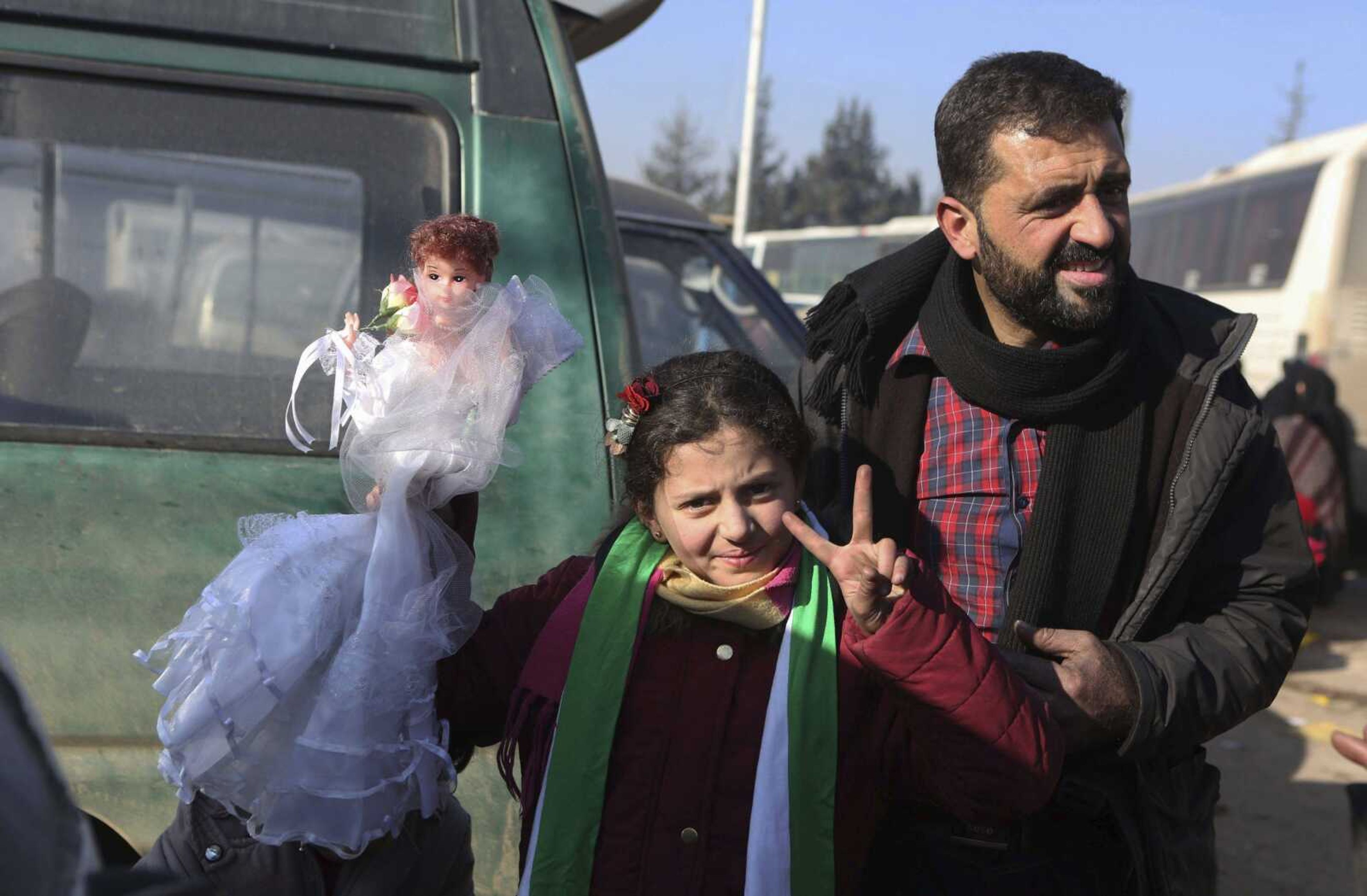Aleppo evacuations in heavy snow end brutal war chapter
BEIRUT -- Hundreds of rebel fighters and civilians, including small children swaddled in thick blankets, were bused out of war-ravaged Aleppo in heavy snow Wednesday as the evacuation of former rebel strongholds entered its final phase. Scenes of buses slowly driving out of Aleppo in a shroud of white offered an evocative finale to what has been one of the most brutal chapters in Syria's civil war...
BEIRUT -- Hundreds of rebel fighters and civilians, including small children swaddled in thick blankets, were bused out of war-ravaged Aleppo in heavy snow Wednesday as the evacuation of former rebel strongholds entered its final phase.
Scenes of buses slowly driving out of Aleppo in a shroud of white offered an evocative finale to what has been one of the most brutal chapters in Syria's civil war.
The departures from Aleppo pave the way for President Bashar Assad to assume full control there, after more than four years of fighting over Syria's largest city.
It marks the most significant victory for Assad since an uprising against his family's four-decade rule swept the country in 2011.
The evacuations were set in motion last week after Syria's opposition agreed to surrender its last footholds in eastern Aleppo.
Since then, about 25,000 fighters and civilians have been bused out, according to the United Nations.
On Wednesday, buses began evacuating the last rebels and civilians, an estimated 3,000 people.
By nightfall, 25 buses carrying hundreds of people had driven in a rare snowstorm from eastern Aleppo to opposition-held areas in the countryside near the city, said opposition activist Ahmad Primo, who was monitoring arrivals at the main drop-off point in the Rashideen district.
The evacuees got off the buses wearing thick jackets and carrying sacks with belongings.
One woman dressed in a black robe and face veil carried a small child swaddled in a heavy yellow blanket.
A man held a toddler whose face was peeking out from under a blanket shielding him from falling snow.
The opposition's Britain-based Syrian Observatory for Human Rights said Wednesday evening with the evacuation of the last group of rebels from eastern Aleppo, Assad was in full control, save for a few positions on the western outskirts of the city that were still in rebel hands.
Meanwhile, the International Committee of the Red Cross said patients and all those requiring medical care had been evacuated from the last hospital in the city's east.
Pro-government forces repeatedly struck medical facilities in rebel-held neighborhoods in their push to expel the opposition from Aleppo this year.
In November, the U.N. said it believed there were no more functioning medical facilities in the eastern part of the city.
Wednesday's bus movements came after evacuations had been suspended for 24 hours, one of several snags and delays since the first bus convoys left the city last week.
Frequent disagreements have erupted between the rebels and the government, as well as among rebel groups, over compliance with a wider deal that also includes evacuations from two rebel-besieged villages, Foua and Kfarya.
The ICRC said about 750 people have been bused out of the villages, leaving hundreds more to be evacuated.
Meanwhile, it was unclear whether any U.N. observers were on the ground in eastern Aleppo on Wednesday, two days after a U.N. Security Council resolution approved their urgent deployment.
Deputy U.N. spokesman Farhan Haq said some U.N. staff were present at a Syrian government checkpoint outside Aleppo's eastern sector, but he couldn't say for sure whether any observers had been let into the onetime rebel-held area.
Elsewhere in northern Syria, fighting intensified in the Islamic State-controlled town of al-Bab, where Turkish troops and Turkey-backed Syrian opposition fighters have been trying to drive the extremists out.
Turkey's state television said 10 Turkish soldiers were killed Wednesday in three separate suicide attacks in al-Bab.
The report by TRT television came hours after Turkish President Recep Tayyip Erdogan said IS was fighting "for dear life" in al-Bab, carrying out suicide bombings and attacks with improvised explosive devices.
A total of 35 Turkish soldiers have died in northern Syria since August, when Turkey sent ground troops to support the Syrian opposition forces in clearing a border area of IS militants and to curb Syrian Kurdish territorial expansion.
Connect with the Southeast Missourian Newsroom:
For corrections to this story or other insights for the editor, click here. To submit a letter to the editor, click here. To learn about the Southeast Missourian’s AI Policy, click here.










